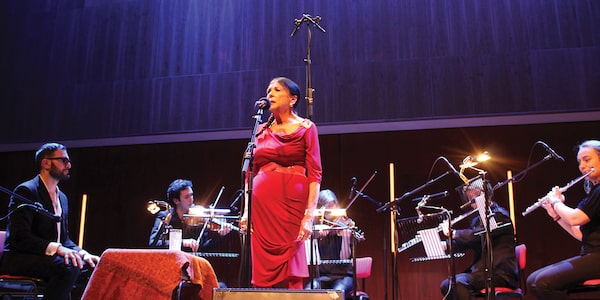
Alanis Obomsawin performs. (File Photo).Annabelle Moreau/Courtesy of Constellation Records
For her interview with The Globe and Mail, Alanis Obomsawin sat down to talk at the hotel right next door to Maple Leaf Gardens. And why wouldn’t she? There was a time when all the rock stars stayed there.
Sure, maybe Obomsawin, a member of the Abenaki Nation and one of Canada’s great documentary filmmakers, isn’t exactly a rock star. But with the recent re-release of her long out-of-print 1988 album Bush Lady (a unique, poetic and quasi-experimental presentation of First Nations music), an important chapter of Obomsawin’s career has been unearthed.
While in Toronto to accept an honorary doctorate at a Ryerson University, the 85-year-old Obomsawin spoke to The Globe about her musical past and, perhaps, Canada’s future.
The album is a reworking of an album you originally did with the CBC in the mid-1980s. You basically released the album on your own in 1988. Now that the Montreal indie-rock label Constellation has re-released the record, do you regret not signing with a label back then?
I think the CBC gave me $250, maybe. I had sung on other people’s albums too. But I was never paid. So, I got fed up with feeling used. When I decided to put out Bush Lady on my own in 1988, I was going to be the big boss. I was going to distribute it. It would be my own thing. But then I had to go and sell the record in stores and collect the money. It was humiliating. I would be told the records had been sold, but the money wasn’t there. I thought “the hell with it.” So I packed everything in boxes, and that was that.
Indigenous music is getting more attention than ever in Canada. Is that why you decided to reissue Bush Lady now?
It wasn’t my decision. At the National Film Board, a young man saw my album. He came into my office and asked if he could buy one. I said, “Buy one? I’ll give you one." He loved it, and asked me if he could sell the copies of the album that I still had. I didn’t think he was serious, but he sold them all. And now Constellation has reissued the album. I’m so amazed.
Do you sense there’s an increased appetite for this kind of music?
Well, I don’t know if I’m a kind of music. I’m not a blues singer or anything like that. I do things I wrote and I do some traditional singing as well. In Ottawa, there was a concert a couple of months ago with a lot of Indigenous people. And, yes, there was a lot of interest.
Interest, and acclaim. Look at Buffy Sainte-Marie, who’s enjoying a career renaissance.
Oh, yes, but she’s extraordinary. Don’t compare me. I think so highly of her. She’s written so many songs, and she’s a fabulous poet. She’s very dedicated.
You were active in the folk music scene in the 1960s, particularly at Mariposa Folk Festival. But you became a filmmaker and, in your words, never looked back. But do you really not look back and think how things could have been different for you?
I don’t think that way at all. I started to sing for very serious reasons. It was to tell stories to children. The educational system was so bad. The history in the classrooms was horrifying. Because it was designed in such a hateful way toward our people, I felt I needed to do something. The children needed to hear a different story.
Do you think Canada is more receptive to hearing the stories now?
Oh, yes, I’ve never witnessed such goodwill as I do now, across the country. The will to start teaching the real history of the country is there. There’s inclusion, in terms of traditions and language. Where we (once) got punished for speaking our language, now we’re encouraged. It’s a different time, and I’m very happy that I’m still here to witness this.
Witness? You’re a big part of it, aren’t you?
Well, I’m working on my 52nd film. I’ve been at the National Film Board for 50 years. Can you imagine that? But a lot of people did their part. Some people were deaf to it. Now there is an honest interest by Canadians in general, who want to see justice and to learn what really happened here.
This interview has been condensed and edited.
 Brad Wheeler
Brad Wheeler